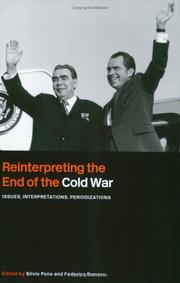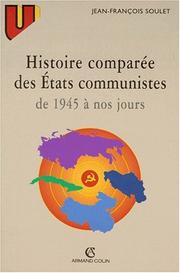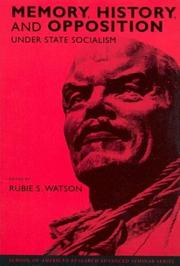| Listing 1 - 10 of 77 | << page >> |
Sort by
|

ISBN: 0714684929 071465695X 0714656003 Year: 2005 Volume: 6 Publisher: London Cass
Abstract | Keywords | Export | Availability | Bookmark
 Loading...
Loading...Choose an application
- Reference Manager
- EndNote
- RefWorks (Direct export to RefWorks)
The history of the Cold War is being re-written according to the newly available sources. But first and foremost it needs to be re-conceptualized and framed within the broader historical context that transformed the Cold War from the 1960s onwards, altered the very dynamics of bipolarism, and eventually brought it to its end. The long duration and the unexpectedly peaceful ending of the Cold War call for new views that transcend the established paradigms about its inception. Historians ought to address all those transformations in the international economy, in the networks of interdependence linking together new areas - especially in Asia - and in the ensuing cultural images that gradually narrowed the relevance of bipolarism. Thus the habitual diplomatic and security themes must be enjoined with economic, ideological, technological and cultural ones. Here a distinguished group of international history specialists discusses the complex relationship between Cold War dynamics, the globalizing of capitalism, and the demise of Soviet Communism. Their controversial and conflicting views, as well as their multidisciplinary approaches, highlight the various factors that constituted (and did not constitute) the Cold War. Thus they help to redefine the concept itself, to map its values and limitations, and to propel historical debate onto new grounds.
World history --- anno 1900-1999 --- Cold War --- Guerre froide --- Congresses --- Congrès --- Communist countries --- Pays socialistes --- History --- Congresses. --- Histoire --- World politics --- #A0505HI --- -Iron curtain lands --- Russian satellites --- Second world (Communist countries) --- Soviet bloc --- Former communist countries --- World politics#A0505HICommunist countries --- Former communist countriesHistory --- -History --- Congrès --- Iron curtain lands

ISBN: 2200014651 9782200014650 Year: 1996 Volume: 324 Publisher: Paris: Armand Colin,
Abstract | Keywords | Export | Availability | Bookmark
 Loading...
Loading...Choose an application
- Reference Manager
- EndNote
- RefWorks (Direct export to RefWorks)
Communisme --- --1945-1990 --- --Europe de l'Est --- --Cuba --- --URSS, --- République populaire chinoise --- --Corée du Nord --- Viêt-Nam --- --3346 --- Communist countries --- History --- -Iron curtain lands --- Russian satellites --- Second world (Communist countries) --- Soviet bloc --- Former communist countries --- -History --- Iron curtain lands --- History. --- --Viêt-Nam --- --Communist countries --- Europe de l'Est --- Cuba --- URSS, 1922-1991 --- Corée du Nord --- Communist countries - History
Book
ISBN: 1623491428 9781623491420 9781306582339 1306582334 1623490308 9781623490300 Year: 2014 Publisher: College Station, [Texas] : University of Texas at Arlington by Texas A&M University Press,
Abstract | Keywords | Export | Availability | Bookmark
 Loading...
Loading...Choose an application
- Reference Manager
- EndNote
- RefWorks (Direct export to RefWorks)
Approaching the early decades of the "Iron Curtain" with new questions and perspectives, this important book examines the political and cultural implications of the communists' international initiatives. Building on recent scholarship and working from new archival sources, the seven contributors to this volume study various effects of international outreach-personal, technological, and cultural-on the population and politics of the Soviet bloc. Several authors analyze lesser-known complications of East-West exchange; others show the contradictory nature of Moscow's efforts to consolidate
Exchange of persons programs, Soviet --- Soviet exchange of persons programs --- History. --- Communist countries --- Soviet Union --- Iron curtain lands --- Russian satellites --- Second world (Communist countries) --- Soviet bloc --- Former communist countries --- Relations. --- Relations
Book
ISBN: 022654768X 9780226547688 Year: 2018 Publisher: Chicago : University of Chicago Press,
Abstract | Keywords | Export | Availability | Bookmark
 Loading...
Loading...Choose an application
- Reference Manager
- EndNote
- RefWorks (Direct export to RefWorks)
When viewed from space, the Korean Peninsula is crossed by a thin green ribbon. On the ground, its mix of dense vegetation and cleared borderlands serves as home to dozens of species that are extinct or endangered elsewhere on the peninsula. This is Korea's demilitarized zone-one of the most dangerous places on earth for humans, and paradoxically one of the safest for wildlife. Although this zone was not intentionally created for conservation, across the globe hundreds of millions of acres of former military zones and bases are being converted to restoration areas, refuges, and conservation lands. David G. Havlick has traveled the world visiting these spaces of military-to-wildlife transition, and in Bombs Away he explores both the challenges-physical, historical, and cultural-and fascinating ecological possibilities of military site conversions. Looking at particular international sites of transition-from Indiana's Big Oaks National Wildlife Refuge to Cold War remnants along the former Iron Curtain-Havlick argues that these new frontiers of conservation must accomplish seemingly antithetical aims: rebuilding and protecting ecosystems, or restoring life, while also commemorating the historical and cultural legacies of warfare and militarization. Developing these ideas further, he shows that despite the ecological devastation often wrought by military testing and training, these activities need not be inconsistent with environmental goals, and in some cases can even complement them-a concept he calls ecological militarization. A profound, clear explication of landscapes both fraught and fecund, marked by death but also reservoirs of life, Bombs Away shows us how "military activities, conservation goals, and ecological restoration efforts are made to work together to create new kinds of places and new conceptions of place."
Restoration ecology --- Military base conversion --- Nature conservation --- Restoration ecology. --- Military base conversion. --- Nature conservation. --- Iron Curtain. --- conservation. --- demilitarized zone. --- ecological restoration. --- environmental protection. --- historical erasure. --- militarization. --- militarized landscapes. --- wildlife refuges.
Book
ISBN: 0080246656 Year: 1981 Publisher: New York
Abstract | Keywords | Export | Availability | Bookmark
 Loading...
Loading...Choose an application
- Reference Manager
- EndNote
- RefWorks (Direct export to RefWorks)
Political participation --- -#SBIB:324H50 --- #SBIB:328H220 --- #SBIB:328H50 --- Citizen participation --- Community action --- Community involvement --- Community participation --- Involvement, Community --- Mass political behavior --- Participation, Citizen --- Participation, Community --- Participation, Political --- Political activity --- Political behavior --- Political rights --- Social participation --- Political activists --- Politics, Practical --- Congresses --- Politieke participatie en legitimiteit (referenda, directe democratie, publieke opinie...) --- Instellingen en beleid: Oost-Europa: comparatief / diverse landen --- Instellingen en beleid: Azië: comparatief / diverse landen --- Communist countries --- -Iron curtain lands --- Russian satellites --- Second world (Communist countries) --- Soviet bloc --- Former communist countries --- Politics and government --- -Congresses --- Congresses. --- -Politics and government --- #SBIB:324H50 --- Iron curtain lands
Book
ISBN: 3839448786 3837648788 Year: 2019 Publisher: Bielefeld transcript Verlag
Abstract | Keywords | Export | Availability | Bookmark
 Loading...
Loading...Choose an application
- Reference Manager
- EndNote
- RefWorks (Direct export to RefWorks)
Geprägt von experimentellen oder subversiven Ansprüchen standen die Aktionskünstler_innen sozialistischer Länder nicht nur den tradierten Kunstgattungen kritisch gegenüber, sie problematisierten auch dezidiert gesellschaftliche Automatismen, parteipolitisch idealisierte Menschenbilder oder die modernistischen Ideologien eines global verbreiteten, kompetitiven Fortschrittsglaubens. Die Beiträge des Bandes zeigen das breit gefächerte Spektrum von künstlerischen Formen der Kritik im ehemaligen europäischen »Ostblock«, deren widerständige Artikulationen von spontanen Interventionen im öffentlichen Raum bis hin zu konstruktiven Reformvorschlägen für einen besseren Sozialismus reichten. Besprochen in: Vier Viertel Kult, Sommer 2020
Kunst; Performance; Osteuropa; Aktionskunst; Kritik; Politische Kunst; Eiserner Vorhang; Kulturkritik; Ostblock; Sozialismus; Reform; Repression; Theatergeschichte; Kulturgeschichte; Geschichte des 20. Jahrhunderts; Kunstgeschichte; Kulturwissenschaft; Art; Eastern Europe; Action Art; Critique; Political Art; Iron Curtain; Criticism of Culture; East Block; Socialism; History of Theatre; Cultural History; History of the 20th Century; Art History; Cultural Studies --- Action Art. --- Art History. --- Criticism of Culture. --- Critique. --- Cultural History. --- Cultural Studies. --- East Block. --- Eastern Europe. --- History of Theatre. --- History of the 20th Century. --- Iron Curtain. --- Performance. --- Political Art. --- Reform. --- Repression. --- Socialism.
Periodical
ISSN: 03605930 Publisher: Tempe, Ariz.
Abstract | Keywords | Export | Availability | Bookmark
 Loading...
Loading...Choose an application
- Reference Manager
- EndNote
- RefWorks (Direct export to RefWorks)
Comparative economics --- Comparative economics. --- Economic history. --- History, Economic --- Economics --- Comparative economic systems --- Economics, Comparative --- Economic policy --- Communist countries --- Communist countries. --- Iron curtain lands --- Russian satellites --- Soviet bloc --- Former communist countries --- Second world (Communist countries) --- Economic conditions --- Business, Economy and Management --- Chemistry --- Social Sciences --- General and Others --- Developmental Issues & Socioeconomic Studies --- Business economics --- #BLIC:TSCAT --- Periodicals
Periodical
ISSN: 00306444 23666730 Publisher: Baden-Baden Nomos Verlagsgesellschaft mbH & Co. KG
Abstract | Keywords | Export | Availability | Bookmark
 Loading...
Loading...Choose an application
- Reference Manager
- EndNote
- RefWorks (Direct export to RefWorks)
Law --- Eastern and Central Europe --- #BA01243 --- #RBIB:TSCAT --- General and Others --- Law. --- Recht. --- LAW. --- EASTERN EUROPE. --- Communist countries. --- Eastern Europe. --- Acts, Legislative --- Enactments, Legislative --- Laws (Statutes) --- Legislative acts --- Legislative enactments --- Jurisprudence --- Legislation --- Regions --- Europe, Eastern --- East Europe --- Communist countries --- Iron curtain lands --- Russian satellites --- Soviet bloc --- Former communist countries --- socialist countries. --- Europe orientale. --- pays socialistes. --- Europa Oriental. --- países socialistas.
Periodical
ISSN: 00012645 Publisher: Tempe, Ariz.
Abstract | Keywords | Export | Availability | Bookmark
 Loading...
Loading...Choose an application
- Reference Manager
- EndNote
- RefWorks (Direct export to RefWorks)
Economic history. --- Economic policy. --- Communist countries --- Communist countries. --- Iron curtain lands --- Russian satellites --- Second world (Communist countries) --- Soviet bloc --- Former communist countries --- Economic conditions --- Economic policy --- Economics --- Business economics --- Business, Economy and Management --- Social Sciences --- Business Management --- Developmental Issues & Socioeconomic Studies

ISBN: 093345287X 0933452861 Year: 1994 Volume: *6 Publisher: Sante Fe School of American Research Press
Abstract | Keywords | Export | Availability | Bookmark
 Loading...
Loading...Choose an application
- Reference Manager
- EndNote
- RefWorks (Direct export to RefWorks)
Communist countries --- Pays communistes --- Historiography --- Historiographie --- S04/0200 --- S06/0405 --- China: History--Historiography and theory of history --- China: Politics and government--CCP, history and ideology: general --- Iron curtain lands --- Russian satellites --- Second world (Communist countries) --- Soviet bloc --- Former communist countries --- Historiography. --- Communist countries - Historiography.
| Listing 1 - 10 of 77 | << page >> |
Sort by
|

 Search
Search Feedback
Feedback About UniCat
About UniCat  Help
Help News
News